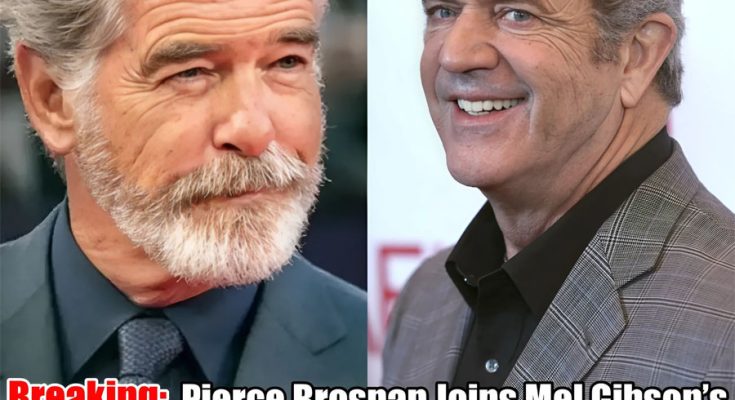
BREAKING: Pierce Brosnan Teams Up With Mel Gibson’s New Unwoke Film Studio — ‘It’s the Right Thing to Do,’ He Says. In a stunning move that’s shaking up Hollywood, Pierce Brosnan has officially teamed up with Mel Gibson’s newly launched unwoke film studio. Why did the former 007 decide to make this bold leap—and what does it mean for the future of mainstream entertainment? Brosnan’s surprising announcement hints at a deeper cultural shift taking place behind the camera lens.
Breaking: Pierce Brosnan Joins Mel Gibson’s New Non-Woke Production Studio — “It’s the Right Thing to Do”
In a bold move that has Hollywood insiders buzzing and traditional media scrambling for spin, legendary actor Pierce Brosnan has officially joined forces with Mel Gibson and his rapidly growing Non-Woke Production Studio, declaring publicly, “It’s the right thing to do.”
The unexpected alliance between two iconic figures marks a major turning point in the culture war unfolding within the entertainment industry — and signals that the rebellion against “woke Hollywood” is attracting serious star power.
A Stunning Partnership That’s Turning Heads
Once best known as James Bond, Brosnan is now lending his gravitas and global appeal to a movement that’s challenging the very foundations of mainstream Hollywood. Sources close to the studio confirm that Brosnan will not only star in upcoming projects but will also serve as an executive producer and creative advisor to shape the direction of the content.
In an official statement released this morning, Brosnan said:
“For years, I’ve watched good stories get buried under political messaging and identity checklists. I came to this studio because I believe in storytelling that connects with people — not lectures disguised as entertainment. It’s the right thing to do.”
What Is Non-Woke Productions?
Founded by Mel Gibson earlier this year — alongside other bold names like Mark Wahlberg and Roseanne Barr — Non-Woke Productions was launched as a direct response to what its founders describe as “Hollywood’s obsession with virtue signaling, censorship, and ideological conformity.”
The studio has pledged to create content that is patriotic, character-driven, spiritually grounded, and proudly unfiltered. Their debut series, Rise Up, Heroes, is already in pre-production and expected to launch next year.
Gibson, known for his unrelenting directorial vision and controversial candor, welcomed Brosnan with open arms:
“Pierce is a real one — an artist with courage and class. He believes in truth, and he believes in freedom. That’s exactly what this studio is about.”
Brosnan’s Career Pivot: From Bond to Bold
The move marks a notable pivot for Brosnan, who has largely stayed away from political discourse in the past. Known for his elegance, charm, and international appeal, Brosnan’s decision to align with a “non-woke” platform is being seen by many as a symbolic break from Hollywood orthodoxy.
Sources say Brosnan will headline an upcoming action-thriller under the new banner titled The Quiet Patriot, in which he’ll play a retired intelligence officer pulled back into the fray to expose government overreach. The project, insiders claim, was passed over by several major studios for being “too politically sensitive.”
Industry Reaction: Cheers, Gasps, and Controversy
The announcement has ignited a firestorm of reaction. Supporters of the Non-Woke movement are celebrating Brosnan as a “hero of common sense,” praising his courage to step outside Hollywood’s ideological echo chamber.
A trending post on X (formerly Twitter) read:
“Pierce Brosnan joining Gibson’s studio? The rebellion just got classy. Hollywood better buckle up.”
On the other side, critics and progressive commentators are labeling the move as “disappointing” and “a betrayal of inclusive storytelling,” accusing Brosnan of lending legitimacy to a growing anti-woke backlash.
A writer for a prominent entertainment outlet tweeted:
“Another aging actor cashing in on grievance politics. Sad to see.”
What’s Next for Non-Woke Productions?
With Brosnan now officially onboard, the studio’s momentum is undeniable. Insiders say at least three major film projects and two television series are in active development, all centered around themes of individual freedom, tradition, redemption, and heroism without apology.
And according to early reports, more A-listers are quietly expressing interest in joining — signaling that the “silent majority” of Hollywood might not be so silent for much longer.
Bottom Line
Pierce Brosnan isn’t just joining a new studio — he’s joining a movement. And with names like Mel Gibson, Mark Wahlberg, and Roseanne already in the trenches, Non-Woke Productions is shaping up to be one of the most disruptive forces in modern entertainment.
Whether you love it or loathe it, one thing is clear:
The culture war has a new front — and James Bond just picked a side.



